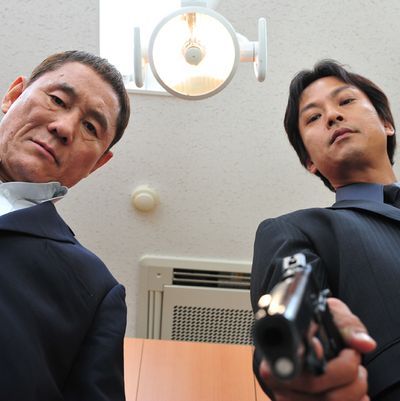
ItÔÇÖs not too long into Takeshi KitanoÔÇÖs Outrage that you may begin to lose track of whoÔÇÖs who, and why exactly theyÔÇÖre being killed and/or horribly maimed. But soon afterward, you may also realize you donÔÇÖt care┬áÔÇö not because whatÔÇÖs happening isnÔÇÖt compelling, but because it eventually starts to take on an abstract quality that reaches beyond the fairly standard (if convoluted) crime narrative ostensibly unfolding onscreen.
Writer-director-star-TV-host and all-around Japanese pop-culture icon KitanoÔÇÖs greatest films have played moments of random violence against oddly poetic digressions; indeed, the prevailing mood in his earlier gangster classics like Sonatine (1993) or Fireworks (1997) is lyrical, almost playful. So the formal, almost severe nihilism of Outrage comes as a bit of a shock at first. The story starts off with a massive Tokyo crime syndicateÔÇÖs boss exhorting his lieutenant Yakuza leaders to rein in a stray group of drug-dealing gangsters; Kitano (who himself plays one of the mid-level mob execs entrusted with said reining-in) then carefully, coolly catalogues the criminalsÔÇÖ hierarchy as the command gets passed down the line, with predictably treacherous digressions from various underlings. There seem to be countless characters in this film┬áÔÇö each with his own little fiefdom of power, however minuscule, in this massive organization. But authority in this case is like a virus; in the end, it consumes practically everyone. All we ever seem to know about any of the characters is whom they report to, whom they boss around, and (eventually) how they die.
ItÔÇÖs amazing to think that, for a film with such a comically high body (and body-part) count, almost nobody ever raises their voice. Kitano gives us endless scenes of men in suits sitting around tables talking, then gives us the bloody consequences of their actions. That seems like itÔÇÖd lend itself to a kind of Olympian despair (after all, The Godfather films worked a similar contrast between the calm confidence of power and the mad chaos of its execution), but Kitano is far too exacting a director for that. Even when a guy is getting stabbed in the ear with a chopstick, Outrage is so controlled youÔÇÖre liable to go mad watching it. Somehow both stifling and beautiful, itÔÇÖs the Salo of Yakuza pictures.
Kitano has often tried to break out of the crime genre, so perhaps the despair here isnÔÇÖt so much onscreen as it is behind the camera. Indeed, one could almost sense in the filmÔÇÖs endless repetition of meetings and murder a kind of metaphor for the genre directorÔÇÖs anxiety at having to deliver the goods. After all, the filmmaker himself is in a business where men in suits sit around tables talking and agreeing about (cinematic) bloodletting. Perhaps, after all the idiosyncratic soul heÔÇÖs brought to his gangster movies over the years, Kitano has finally decided to give the audience the purest form of what they want. Outrage isnÔÇÖt a movie; itÔÇÖs a purge.


